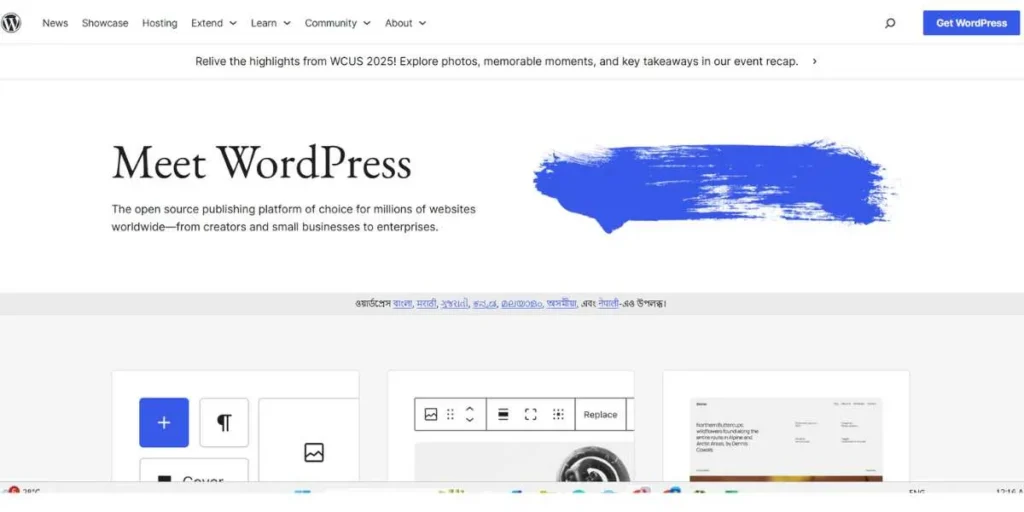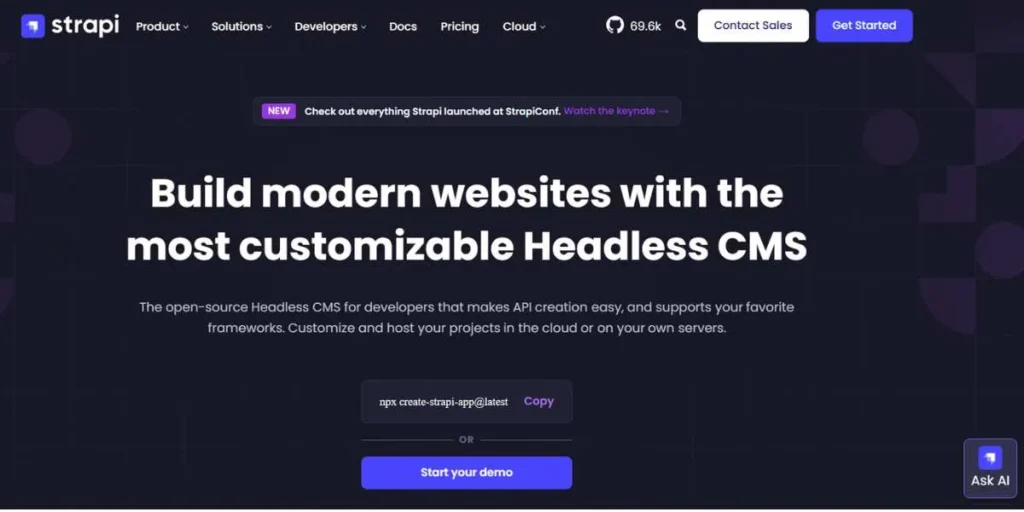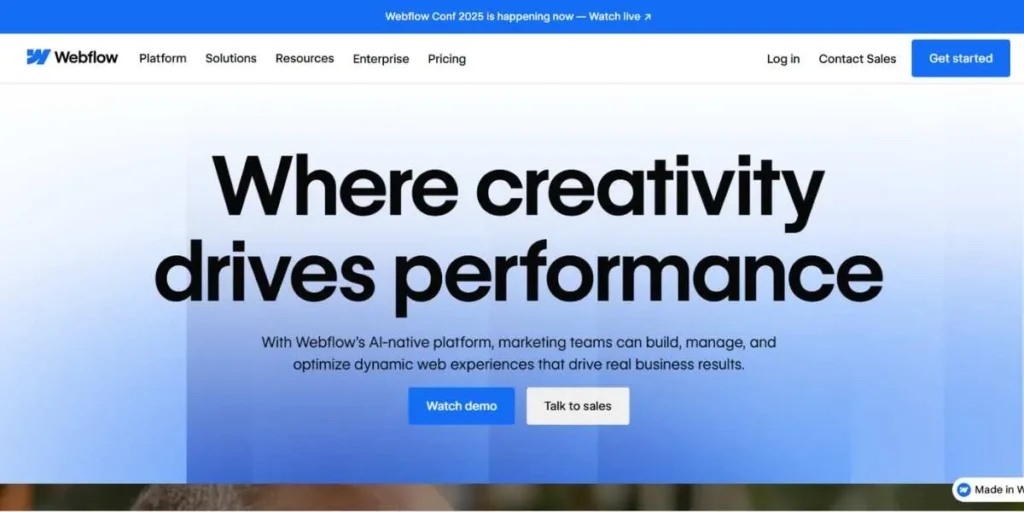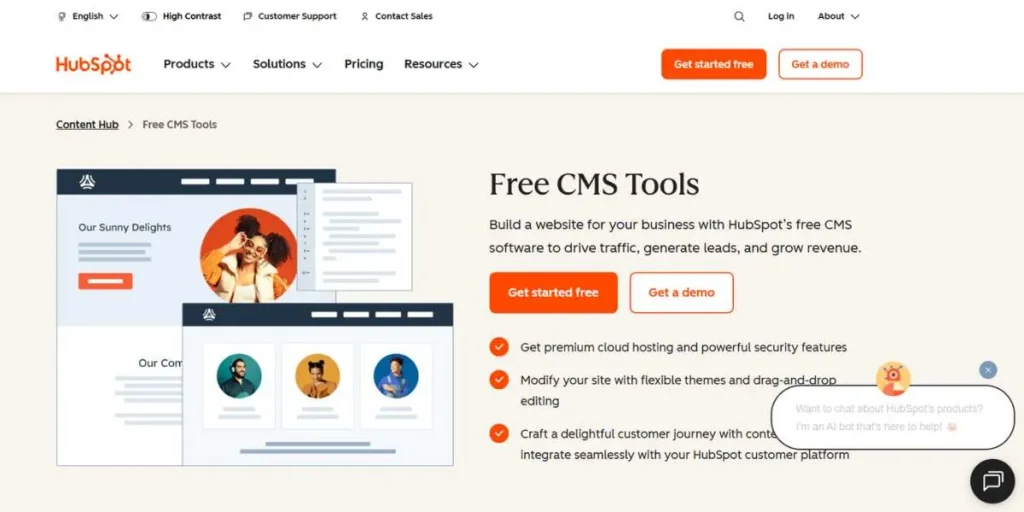10 Best CMS for SEO in 2025: Power Your Rankings & Traffic

Under determination of search engine success online, the selection of the best CMS for SEO is vital since search engines are undergoing intelligence enhancement. The correct CMS is able to boost and damage the visibility of your site and the ranking of the site in terms of search directly impacts the growth of free traffic and business.
The current CMS platforms are also expensive and up-to-date with better SEO tools, such as automated schema markup and Core Web Vitals enhancements. However, out of all systems, not all of them suit SEO. This guide examines the optimal CMS alternatives to use in 2025, the strengths, and weaknesses of each ESDs search engine, and indicates when the application is preferable to the others so that you can select the most valuable applications that suit your objectives.
What is a CMS (Content Management System)
A CMS is a software that allows users to create, manage and modify digital contents without the ability to do hard tech. The weight of websites is on modern CMS for seo platforms, which provide convenient options to write, edit and post content. They maintain the parting of duties between the content and design in order to enable multiple individuals to collaborate and maintain a unified branding and feature set.
CMS systems have the capability of basic page creation and even advanced e-comm, user accounts and even search optimization. In 2025 you may opt-in either of the more traditional systems such as WordPress or headless configurations in which content management and content presentation are divided. Headless systems also allow more flexibility in the development and marketing of more performance and search visibility.
What Makes a CMS Good for SEO?
- Technical SEO base: clean HTML, fast speed, mobile-compatibility, and well organized information such that search engines are able to crawl and index with ease.
- Content optimization tools: in-built assistance with meta tags, title manipulation, personalizing web addresses, as well as linking the inter-page search engine optimization.
- Performance optimisation: Core Web Vitals, caching, image optimisation, and access to a CDN to provide the user with a superior experience.
- Schema markup support: simple or automatic structured data to make search engines understand what are those contents about and provide snippets.
- SEO eco system: a lot of SEO extensions and plugins will be added that will give more advanced features such as XML sitemaps and keywords counts.
- Analytics integration: with a simple connection to Google Analytics, Search Console and other SEO services, it is possible to make a data-oriented SEO choice.
Comparison Table of Best SEO CMS Platforms
| CMS Name | Type | Best SEO Feature | Pricing | Best For |
| WordPress | Traditional | Extensive plugin ecosystem | Free (hosting costs) | Bloggers, Small Businesses |
| Drupal | Traditional | Advanced taxonomy system | Free (hosting costs) | Enterprises, Developers |
| Strapi | Headless | API-first performance | Free/Paid plans | Developers, Modern Frameworks |
| Joomla | Traditional | Built-in multilingual SEO | Free (hosting costs) | Medium-sized Businesses |
| Wix | All-in-One | AI-powered optimization | $14-$39/month | Beginners, Small Businesses |
| Webflow | Hybrid | Clean code generation | $12-$36/month | Designers, Agencies |
| Contentful | Headless | Multi-channel delivery | $300+/month | Enterprises, Multi-platform |
| HubSpot CMS | All-in-One | Integrated marketing tools | $360+/month | B2B Companies, Marketing-focused |
| Squarespace | All-in-One | Beautiful templates + SEO | $12-$40/month | Creative Professionals |
| Shopify | E-commerce | Product-focused SEO | $29-$299/month | E-commerce, Online Retailers |
List of Best CMS for SEO in 2025
Best CMS for SEO (Free Options)
1. WordPress

WordPress is still the powerhouse of content management, serving more than 43% of the entire, worldwide web. This platform is the most flexible open-source with thousands of themes and plugins. WordPress is an extremely SEO friendly CMS and has good page speed and friendly user experience which presents it as the best CMS for SEO in the hands of most users. Its large community following and constant updating make it compatible with the latest search engine requirements. The user-friendliness of the platform is facilitated by the user-friendly editor and its personalizations, which involves both beginners and developers aiming to shape their SEO plan fully.
Best SEO Features:
- Yoast SEO integration
- Clean URL structure
- Fast loading
- XML sitemap
Pros:
- Large plugin library
- Strong community support
- Personally manageable interface.
Cons:
- Needs regular maintenance
- Security issues can appear
- Plugins may conflict
Best For: Bloggers, small business owners or content creators that desire the most flexibility and control in SEO.
Read my next blog: Content management system Software
2. Drupal

Known for its flexibility and scalability, Drupal is a CMS that offers advanced SEO features. One notable feature is its support for semantic markup, which helps search engines find and better understand your website’s content and context. This enterprise-grade platform excels in complex, multi-site environments where security and performance are paramount. Drupal 10 helps users enhance their website’s visibility on search engines with improved meta tags, structured data, and canonical URLs, making it another excellent choice for the best CMS for SEO category, particularly for larger organizations with technical resources.
Best SEO Features:
- Advanced taxonomy system
- Semantic markup
- Multi-language SEO
- Custom content types
Pros:
- Enterprise-level security
- Great scalability
- Robust user management
Cons:
- Steep learning curve
- Limited theme choices
- Technological knowledge is needed.
Best For: Large organizations, government portals, and multi-site complex setups which require a high level of security.
3. Strapi (Headless CMS)

Strapi is a headless CMS system of the new era, that splits management of the content and the presentation layers. This new technology enables one to build blazing fast websites with any front-end technology, with the benefit of having centralized content management. The API-first framework allows connecting easily with modern frameworks such as React, Vue, or Angular. Local agencies focused on performance and developer flexibility should tend to use Strapi because of its high level of SEO potential and the possibility of custom implementation. Its expanding ecosystem and active development makes it even more popular with tech-leading companies demanding SEO performance on the best CMS for seo.
Best SEO Features:
- API-first performance
- Custom field types
- Multi-language content
- Flexible modeling
Pros:
- Very fast delivery
- Developer-friendly API
- Modern tech stack
Cons:
- Needs development skills
- Few non-technical options
- Smaller community
Best For: To develop high-performance and tailored websites using current frameworks, developers and agencies.
4. Joomla

Joomla offers the balance between the simplicity of WordPress and the complexity of Drupal, with medium-sized websites with powerful capabilities. It is a robust platform, capable of effective user management, with multiple languages and solid customizable SEO Bases. Even though not as popular as WordPress, Joomla also has its own community and keeps growing with the modern web standards. Built-in SEO integrations in it are URL re-hire and meta tag administration, and even search reachable routing. Joomla offers a balanced tradeoff of the best CMS For seo to use in SEO since it is not as complex as Drupal yet offers more organization than WordPress.
Best SEO Features:
- Built-in SEO settings
- URL rewriting
- Multi-language SEO
- Advanced user management
Pros:
- Balanced in complexity
- Strong security
- In-built multi-linguous support.
Cons:
- Smaller community
- Limited templates
- Few plugins
Best For: Medium sized business, membership websites and multi language website where a well organized content is requisite.
5. Wix

Wix is now a properly featured site platform with advancing SEO, unlike a drag-and-drop provider. Its AI-enabled capabilities and automated optimization services ensure ease of use to users with no technical skills. New changes have solved the SEO restrictions of the past, such as the accelerated pages, mobile design, and structured data. Wix is currently behind rival CMS platforms in terms of highly developed search engine optimization capabilities, but its simplicity and marketing functionality are expected to appeal to small businesses. The constant upgrades and attention to the user experience of the platform makes it a rising challenger in the best CMS for SEO arena.
Best SEO Features:
- Automated SEO suggestions
- Built-in site optimization
- Mobile-first indexing
- Integrated analytics
Pros:
- Very user-friendly
- All-in-one
- No maintenance
Cons:
- Limited customization
- Uncapable of easily changing templates.
- Less advanced SEO
Best For: It would be best for personal sites, small businesses and those who aim to be as simplified as possible without intensive control of the site.
Read my next blog: Squarespace Alternatives
Best Paid & Premium CMS Platforms for SEO
6. Webflow

Webflow is a unique site among designers and marketers because it unites visual design tools with a high degree of CMS for seo capabilities. It purifies, makes semantic markup and CSS automatically and lets you manipulate any design element using a visual interface. The site loads quickly since it develops light code which loads quickly on any device. Webflow includes SEO assistance such as the automatic generation of a sitemap, simple editing of meta tags, and structured data. Since it deals with design, it is also effective in SEO, thus it can be one of the recommended brands to be online and still look good at the same time.
Best SEO Features:
- Clean code generation
- Visual SEO optimization
- Automated respondent design.
- Programmed performance optimization.
Pros:
- Design and development integration C15.
- No plugin dependencies
- No Good hosting performance.
Cons:
- Higher learning curve
- Premium pricing structure
- a small number of third-party integrations.
Best For: Designers and agencies and brands that require tailor design and a high level of SEO.
7. Contentful (Headless CMS)

Contentful is a frontrunner in the headless-CMS movement as it provides large-company content equipment to distribute to the present-day online experiences. It operates with API which allows the delivery of content to numerous places having only one, central source. With content dispassionately correlated with appearance, a site can write a clean front-end and pass the Core Web Vitals. Contentful has a powerful API and numerous integrations that make it effective with complicated, multi-channel strategies. When companies run sites, apps, and other digital channels, they tend to use Contentful as their primary SEO-friendly CMS for seo when they require scaling, fast solutions.
Best SEO Features:
- Multi-channel content delivery.
- API-based performance optimization.
- Advanced content modeling
- Global CDN distribution
Pros:
- Enterprise scalability capabilities.
- Multi-platform content distribution.
- Friendly API architecture to the developer.
Cons:
- Technological implementation is required.
- Higher cost structure
- Learning curve complexity
Best For: Enterprise businesses, multi-channel brands, and development team construction of scalable digital ecosystems.
8. CMS Hub (HubSpot)

The developing CMS Hub by HubSpot combines with marketing, sales, and service solutions of the company to create a single growth ecosystem. It sticks heavily on leads driving and enhancing conversion and remaining robust on SEO. In-house marketing, such as A/B tests, personalization, and analytics, provide intensive understanding of how to achieve greater optimisation. The inbound marketing of HubSpot is aligned to the modern SEO methods and thus, makes planning the contents smarter. CMS for seo Hub is an excellent SEO oriented CMS with a very specialized attitude to growth driving marketing and sales intertwined businesses.
Best SEO Features:
- Custom marketing analytics.
- Sophisticated customisation of profiles.
- The lead generation can be optimized.
- A/B testing integration
Pros:
- Full-fugue marketing ecosystem.
- Built‑in CRM integration
- Secondly, high-level analytics.
Cons:
- Higher pricing tiers
- HubSpot ecosystem dependency.
- Learning curve complexity
Best For: B2B firms, organizations that focus on marketing and those that desire the combination of sales and marketing.
9. Squarespace

Squarespace boasts of professional templates, sleek and smooth, and feature scales in terms of SEO. It allows you to modify the titles, descriptions and value of the URLs; automatically generates sitemaps and takes a search-friendly form. Its design-](1)-based layout provides support to search, and clean code and friendliness-to-mobile in each template. Newer developments enhanced the ones available in Core Web Vitals and provided more SEO options. Although not customizable as open-source tools, Squarespace offers reliable SEO to firms that concentrate on fantastic appearance and user-friendliness as their primary company range of CMS for seo in search engine optimization.
Best SEO Features:
- Clean data structure.
- Automatic mobile optimization.
- inbuilt analytics integration.
- SSL certificates included
Pros:
- Beautiful design templates
- All‑in‑one hosting solution
- Excellent customer support
Cons:
- Only a few solutions to customization.
- Problems with template switching.
- Less advanced SEO
Best For: Innovative workers, under-user businesses and customers who wish to support design appeal and have an excellent SEO performance.
10. Shopify

Shopify is leading in e-commerce CMSs, but they provide the complete online store services and enhance SEO websites. Major areas of emphasis include product SEO, provision of structured data, links to inventory as well as conversion assistance. New versions also make sites faster, enhance mobile speed, and increase Core Vitals. It provides additional SEO features in the form of third-party extensions, which are available on the big app shop. Shopify offers an ideal combination of selling capabilities and search rank, making it the e-commerce success standard in online stores that require the services offered through the best CMS for SEO.
Best SEO Features:
- E‑commerce structured data
- Product SEO optimization
- Fast checkout performance
- Mobile commerce Optimization.
Pros:
- Full e-commerce operation.
- Extensive app marketplace
- Secure server security.
Cons:
- E‑commerce focus limitation
- Subscription requirements monthly.
- Restrictions on template customisation.
Best For: E-commerce companies, internet stores, and entrepreneurs that build websites about products.
How to Choose the Right CMS for SEO
- Technical Requirements Assessment: Make sure that your team has the technical capability, developer resources, and to maintain the property that matches the complexity of the platform.
- Content Strategy Alignment: the amount of content available, the frequency of updating, the languages required, and the content can be checked to ensure the CMS suits your workflow.
- Execution Objectives: Choose a platform to achieve by determining the significance of Core Web Vitals, mobile traffic and speed.
- Scalability Planning: Plan now on how you may grow and how much traffic you may have or new features that your business may need to do and ensure you have a CMS that can expand with you.
- Budgets: Sum up the hosting, premium features, Dev time and recurring maintenance to make a budget balance.
- Integration Requirements: Determine the third-party tools, marketing platforms, and business systems, and determine whether you need them to ensure a smooth collaboration between them and the CMS.
Bonus: Tools to Enhance CMS SEO
Google Search Console (must-have for all CMS)
- How it helps SEO: It monitors how your site appears on Google search engines and lets you know your ranking, identifies indexing errors and tells you how to do better.
- Why it Matters: This is important to understand how Google would perceive your site, solving technical issues, and understanding SEO performance on any CMS.
Plugins & Integrations
Yoast SEO
- How it helps SEO: Shows you how to work through each page to the maximum effectiveness, creates an XML map, and search engine commenter of the WordPress contents.
- Why it Matters: It will simplify SEO to people who do not understand technology to a high level and remain high-quality.
Rank Math
- How it helps SEO: includes new options such as schema, key word tracking, and access to information intending optimization.
- Why it Matters: It provides powerful, enterprise-type SEO features within a minimal interface, which is often superior to their aged counterparts.
Metatag
- How it helps SEO: Processes the meta tags, Open Graph data and structured data on a large portion of CMS sites to enhance the search results.
- Why it Matters: It maintains all the metadata of the page making it consistent and optimized providing rich croppies and improved social sharing.
Performance Tools (CDN, Caching, Schema Generators)
CDNs (Cloudflare, Fastly)
- How it helps SEO: It can be used to speed up the site by delivering it through the local servers, which improves Core Web Vitals.
- Why it Matters: The faster the page loads the better, so a CDN will be important in proper SEO.
WP Rocket (WordPress)
- How it helps SEO: Enhances performance by using caching, clean database, and the minification of the code.
- Why it Matters: This will help speed up the site and increase Core Web Vitals and aid in search results and allow people to remain content.
Analytics & Monitoring
Google Analytics 4
- How it helps SEO: SEO can identify who sees your site, their site paths, and the content that is most effective in helping you make decisions.
- Why it Matters: It provides major statistics to observe the impact of SEO on business objectives and identify opportunities to enhance the content of any CMS.
Conclusion
The best CMS for SEO in 2025 involves consideration of what one needs, his or her technical knowledge, and the speed at which you want to develop. WordPress is the best to remain the leader due to its flexibility and the numerous SEO extensions. Fast systems like Strapi and Contentful may be used by teams that have high technical skills.
Drupal and WordPress are both more search engine friendly, though the latter tends to carry the day. The Yoast SEO and other similar plugins can be used by beginners. The optimal CMS to use in search engine optimization is the best that suits the ease of use, technical requirements, budget, and future technological requirements. In order to achieve good performance using any CMS, you need to continue writing content, optimising your site and monitoring its performance.
FAQs
Which is the best CMS for SEO beginners?
WordPress due to easy to use help and dozens of help with easy plugins such as Yoast SEO.
Does having headless CMSs enhance better SEO?
They tend to get better ratings on Core Web Vitals since they are loading quicker.
What is the significance of selecting the CMS when carrying out e-commerce SEO?
Very important. Working through platforms such as Shopify have merchandise built-in opportunities for searching like SEO measures lacked by other CMSs.
Can I switch my CMS and retain my rankings?
Yes, that will have to be done carefully, but there has to be planning on your part, application of 301 redirects, and maintenance of the same types of URLs.
What is most significant in a CMS for SEO?
A: Squeezy, and fast loading, as each of these has an impact on Core Web Vitals and the speed with which search engines can crawl your site.
 Get 50% off on Vault theme. Limited time offer!
Get 50% off on Vault theme. Limited time offer!